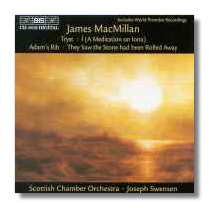
The Internet's Premier Classical Music Source
Related Links
- MacMillan Reviews
- Latest Reviews
- More Reviews
-
By Composer
-
Collections
DVD & Blu-ray
Books
Concert Reviews
Articles/Interviews
Software
Audio
Search Amazon
Recommended Links
Site News
 CD Review
CD Review
James MacMillan

Orchestral Works
- Tryst
- Adam's Rib
- They Saw the Stone had been Rolled Away
- Í (A Meditation on Iona)
Scottish Chamber Orchestra/Joseph Swensen
BIS CD-1019 DDD 58:43
Scottish composer James MacMillan's music deals with rituals. Some of these are explicitly Christian, a reflection of the composer's devout Catholicism. Others are more primitive, perhaps in recognition of the composer's fascination with the rough and sometimes bloody history - which nevertheless contains strongly spiritual elements - of the British Isles. Sometimes, perhaps paradoxically, these elements come together.
Tryst, the only work on this disc not receiving its world première recording, also is the only one of the four not to have an obviously Christian association. However, MacMillan's use of themes from his sung setting of Tryst in works such as the St. Anne's Mass suggests a hidden message. It is a 25-minute work inspired by a poem of the same name by Scottish poet William Soutar. More than a rendezvous, Tryst, as used in this context, implies a heart's commitment. This tone poem, at least at the start, suggests a more restive condition. Even in its more lyrical states, Tryst feels unpredictable and unsettled, even violent. Sudden shifts in mood, timbre, and rhythmic division create consistent excitement. It is an uncompromising showpiece for orchestra that requires gymnastics from the musicians and concentration from the listeners.
The title of Adam's Rib gives a hint to the piece's more general theme: creativity. MacMillan has scored this work for brass quintet (two trumpets, horn, trombone, and tuba). The composer's response to this theme is one of quiet wonderment. The music suggests that creativity is given to Man by the grace of God.
MacMillan adds another trombone and an array of percussion to his Adam's Rib ensemble for They saw the Stone had been Rolled Away, a "short fanfare to celebrate Easter." This work is derived from an earlier work, Visitatio Sepulchri - specifically, from the section in which the women meet angels at the entrance to Christ's tomb. The dark pealing of bells and the violent pounding of a drum emphasize the music's intrinsically ritualistic flavor.
Í, subtitled "A Meditation on Iona," is MacMillan's portrait of an island off the west coast of Scotland where Irish priest St. Columba came in the 6th Century. It was here that he set up the school were young clerics were trained to bring Christ's name to the Northern Picts. Í reflects the harshness of the conditions on desolate Iona, and perhaps also the uncompromising nature of St. Columba himself (and his attitudes to his faith). It is music of innovative colors and huge dynamic contrasts. There may be ritual here, but there is little brilliance.
MacMillan has been Affiliate Composer for the Scottish Chamber Orchestra for a decade, and each of these pieces was commissioned by the orchestra within this past decade. Swensen, the Orchestra's principal conductor since 1996, conducts these works with strength, and BIS's recording engineers cope well with the music's extremes. This disc is a fine complement to two earlier BIS CDs devoted to MacMillan's Triduum series.
Copyright © 1999, Raymond Tuttle


















